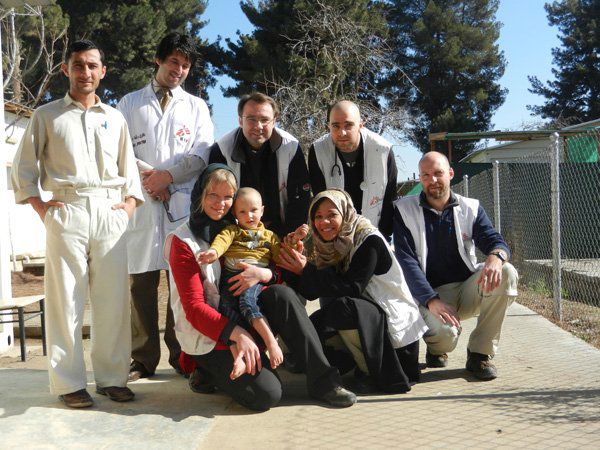The 26th of January dawned bright and normal in Kunduz. As they left for work, the MSF team cheerfully discussed their plans to hold a small dinner for their Australian colleague in honour of Australia Day later that evening. Everybody was in a brighter mood than usual – when you live and work long hours in a tense environment, any small cause for laughter and relaxation is something to look forward to.
Unfortunately, the evening of gentle celebration was not to be.
A bomb explosion was heard in the city at around quarter past five in the late afternoon in the general vicinity of the MSF expatriate house. The MSF team quickly activated the Mass Casualty Plan (MCP) and prepared to receive emergency patients.
Dr. Eva Kusikova, the medical supervisor in the Intensive Care Unit (ICU), was working feverishly with critical patients when a young man of 20-25 years of age was rushed in on a stretcher. It was immediately evident that he was in a bad shape - bleeding, semi-conscious and agitated, with difficulty breathing.
Eva believed that the patient was suffering from internal bleeding and this was affecting his breathing. She quickly ordered him to be transferred into the intensive care unit (ICU) where she put in a chest tube at the site of the internal bleeding to relieve the pressure build up and to instigate an innovative treatment: auto-transfusion, where the blood spilling from the patient is immediately transfused back into his body.
At this point, a further complication arrived. Dr. Eva recalled:
“The patient’s mother, an elderly lady, burst into the ICU, completely distressed and beside herself. For the next few hours, as we were labouring over the patient in the crowded ICU (where other patients were also being treated), that distraught lady kept rushing over to throw her arms over the patient, to cover him with a blanket and unfortunately got in our way no matter how many times we asked her to sit outside. I was extremely frustrated until I found out later that this old lady had originally had three sons… and two of them had been killed in bomb blasts. This prone patient in ICU was her only remaining child, and what had happened to him was a recurrence of her worst nightmare!”
The patient’s condition was so severe that his bleeding filled five blood bags. Eva explained that this would definitely warrant surgery under normal circumstances, but this mass casualty incident was far from normal – at least for us living in this part of the world – and the team surgeons were already occupied with other patients.
For 2-3 hours the team stabilized the patient as best they could, replenishing his blood supply with his own blood. Eva’s quick thinking saved this patient’s life. In the days following the incident, he slowly recovered and was able to return home to his family.
“The only son” is only one of those who get wounded by bomb blasts. To save more suffering people, please donate today to support MSF’s work in Afghanistan. Thank you.
Unfortunately, the evening of gentle celebration was not to be.
A bomb explosion was heard in the city at around quarter past five in the late afternoon in the general vicinity of the MSF expatriate house. The MSF team quickly activated the Mass Casualty Plan (MCP) and prepared to receive emergency patients.
Dr. Eva Kusikova, the medical supervisor in the Intensive Care Unit (ICU), was working feverishly with critical patients when a young man of 20-25 years of age was rushed in on a stretcher. It was immediately evident that he was in a bad shape - bleeding, semi-conscious and agitated, with difficulty breathing.
Eva believed that the patient was suffering from internal bleeding and this was affecting his breathing. She quickly ordered him to be transferred into the intensive care unit (ICU) where she put in a chest tube at the site of the internal bleeding to relieve the pressure build up and to instigate an innovative treatment: auto-transfusion, where the blood spilling from the patient is immediately transfused back into his body.
At this point, a further complication arrived. Dr. Eva recalled:
“The patient’s mother, an elderly lady, burst into the ICU, completely distressed and beside herself. For the next few hours, as we were labouring over the patient in the crowded ICU (where other patients were also being treated), that distraught lady kept rushing over to throw her arms over the patient, to cover him with a blanket and unfortunately got in our way no matter how many times we asked her to sit outside. I was extremely frustrated until I found out later that this old lady had originally had three sons… and two of them had been killed in bomb blasts. This prone patient in ICU was her only remaining child, and what had happened to him was a recurrence of her worst nightmare!”
The patient’s condition was so severe that his bleeding filled five blood bags. Eva explained that this would definitely warrant surgery under normal circumstances, but this mass casualty incident was far from normal – at least for us living in this part of the world – and the team surgeons were already occupied with other patients.
For 2-3 hours the team stabilized the patient as best they could, replenishing his blood supply with his own blood. Eva’s quick thinking saved this patient’s life. In the days following the incident, he slowly recovered and was able to return home to his family.
“The only son” is only one of those who get wounded by bomb blasts. To save more suffering people, please donate today to support MSF’s work in Afghanistan. Thank you.


